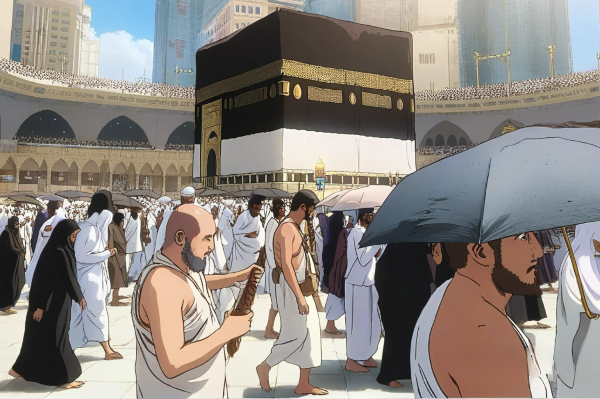Iran’s Plan to Strike Back Against the U.S.
Iran’s Military Preparations Following U.S. Attacks
Loading...

The ceremonies anticipate an attendance of over two million pilgrims this year, offering prayers for peace in Gaza, Yemen, and Sudan.
Over 1.5 million Muslim pilgrims have assembled in Mecca, Saudi Arabia, to embark on the annual Hajj pilgrimage. This year's pilgrimage is set against the backdrop of Israel's ongoing offensive in the Gaza Strip, casting a somber tone over the proceedings.
The pilgrimage commenced on Friday with worshippers encircling the Kaaba, the iconic cubic structure at Mecca's Grand Mosque. Many pilgrims expressed profound sadness as they prayed, mindful of the devastating impact of Israel's prolonged conflict in Gaza.
For Palestinians in Gaza, however, participating in Hajj was not an option this year due to the closure of the Rafah crossing in May, coinciding with Israel's military incursion into Rafah. This closure prevented many from leaving Gaza to embark on the pilgrimage, leaving them feeling deprived and isolated.
Despite these challenges, some Palestinians from the occupied West Bank managed to make the journey to Mecca, along with a thousand more pilgrims invited by King Salman of Saudi Arabia, hailing from families affected by the conflict in Gaza.
However, Saudi authorities have made it clear that no political activities will be tolerated during the Hajj, emphasizing the religious nature of the pilgrimage above all else.
This year's Hajj has also seen the arrival of Syrian pilgrims, traveling directly from Damascus for the first time in over a decade, signaling a thaw in relations between Saudi Arabia and war-torn Syria.
Saudi authorities anticipate a turnout of over two million pilgrims for this year's Hajj, making it one of the largest religious gatherings in the world. The pilgrimage involves a series of rituals spread over several days, culminating in prayers and contemplation at the valley of Arafat.
For many pilgrims, Hajj is a deeply spiritual experience, believed to cleanse sins and strengthen one's connection with God. It also serves as a unifying force for Muslims worldwide, offering an opportunity to pray for peace in conflict-ridden regions such as Yemen and Sudan.
However, the pilgrimage poses challenges, particularly with soaring temperatures reaching up to 44 degrees Celsius (111 Fahrenheit). Saudi authorities have implemented measures to mitigate the effects of the heat, including misting systems and heat-reflective coverings.
Despite the sweltering conditions, pilgrims remain steadfast in their devotion, embracing the spiritual significance of the Hajj and praying for a world free from conflict and suffering.
Iran’s Military Preparations Following U.S. Attacks
Troops remain in five strategic locations, raising fears of renewed tensions and long-term occupation.
Opposition forces have taken control of the capital after a significant offensive. Here is how it unravelled.
